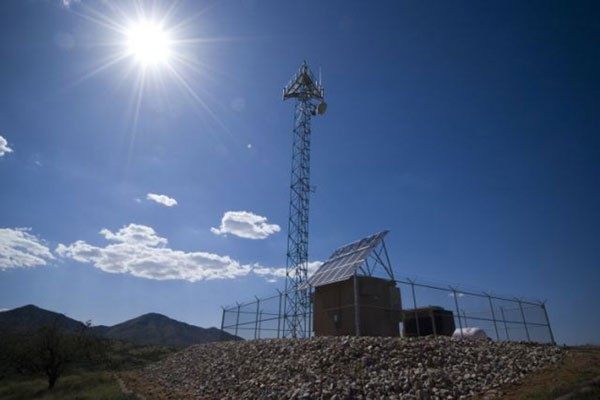The Department of Homeland Security (DHS) is installing seven towers equipped with sophisticated cameras in southern Arizona as part of its Integrated Fixed Tower (IFT) program. These towers are going up in Santa Cruz County, specifically near the cities of Nogales and Rio Rico, as part of a test run. But this is the fourth attempt by DHS to set up such a system, and the last one got cancelled after five years and one billion dollars spent.
Customs and Border Protection Operations Officer John Lawson told KVOA News in Tucson, “Previously officers had to use cameras to pan around to look for things, but with this new radar system, it will tell them right away where there is action.” Some towers are currently being tested, while others towers are in various stages of construction. All are expected to be operational by August.
That timeline is dubious, based on DHS’ history. The IFT contract award was pushed back by several months many times, and what was known as the virtual border fence project under the Secure Border Initiative was pushed back by several years, only to ultimately be scrapped. The virtual border fence was preceded by two other projects that attempted to interconnect underground sensors and above ground cameras and radar with very little success.
Part of the problem was that virtual fence contractor Boeing was trying to create a customized solution with off-the-shelf technology it thought would snap together easily like Lego bricks. Needless to say, it didn’t succeed, resulting in cost overruns in the hundreds of millions of dollars. With the IFT project, DHS decided it wanted a “non-developmental” solution, meaning it wanted the contractor to use existing technology platforms that would work together easily.
Many local ranchers and residents in southern Arizona are happy to see the towers go up because there is so much illegal immigrant and drug smuggler traffic near—and sometimes on—their property. Virginia Clark and her family have owned ranch property for more than 100 years near the location where one of the towers is going up, and she told KVOA, “I know that we feel safer.”
Sylvia Longmire is a border security expert and Contributing Editor for Breitbart Texas. You can read more about the virtual border fence project in her latest book, Border Insecurity: Why Big Money, Fences, and Drones Aren’t Making Us Safer.

COMMENTS
Please let us know if you're having issues with commenting.